Hogwarts Legacy Protagonist is a Psychopath
Hogwarts Legacy is a fantastic and magical game. Not only can you become a wizard, but also a psychopath. The game's protagonist is one of the creepiest characters in video games.
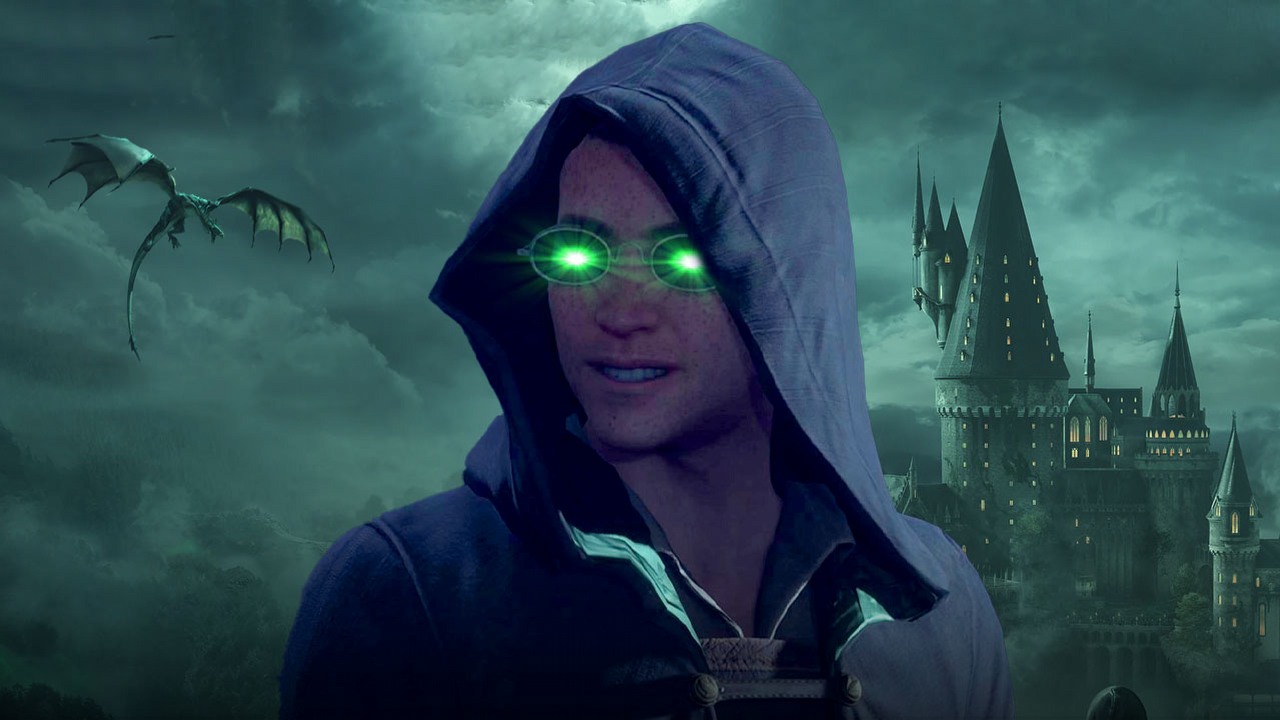
At first, I suspected Asperger's, then rapidly progressing dissocial personality disorder. With a mixture of curiosity and fear, I observed my behavior during conversations with my colleagues, and finally it dawned on me – I was a psychopath.
You can laugh, but something was wrong. In Hogwarts Legacy, we play the role of a student exhibiting psychopathic traits. After over 40 hours in the game, I not only stopped liking him – I no longer trusted him. I constantly suspect my protagonist is up to something. If Avalanche Software decided on a bold twist at the end of the game, and had our character suddenly went berserk, casting Avada kedavras in the school halls and making a massacre, I would not be hugely surprised. I would nod with the confidence of a man who, watching the evening news, repeats: Ha, didn't I tell you so? Perhaps this massacre would contribute to a debate in the wizard world about the connection between violence and universal right to wands...
There's something wrong with me
Almost from the beginning of my school year at Hogwarts, I have the impression that the protagonist secretly cultivates something obscene, corrupt and evil inside. No one knows where they came from, who their parents were, nor if there were any parents at all – it's unknown where they lived and what they did, if they had girlfriends and friends, or maybe abused animals behind the gym after school. All I have to do is smile and people react to me as a long-awaited savior, not aware that I'm as likely to give them a chocolate frog and stab them in the stomach. Often, though, I ended up robbing them.
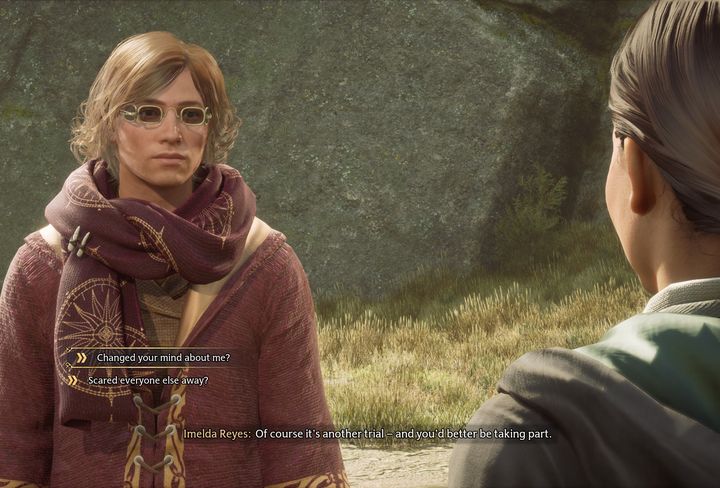
The main character has basically no relationships with people from his House, and relations with other students are sporadic. And once they happen, they're incredibly weird anyway – people tend to open up immediately, and I – apart from the fact that it took me an hour to spill the beans about what happened on my way to Hogwarts – I don't really share anything about myself. I don't tell them who I am. They won't know my story. I just listen, watch, observe. I gather information and learn about them. I nod and sometimes make a face to make them think, of course, I'm all ears, don't mind me staring at you like a creep, like a weirdo. Other students must surely suspect something, though, since for some reason I live completely alone in my dorm.
Everything is fine on the surface – I am rather nice to my schoolmates, and I am respectful towards teachers. I admittedly have a few mishaps on my account that can be potential red flags for someone who's very attentive. For example, even though I was accepted straight into the 5th year and on special terms (which puts me in the spotlight), in my first potions class, I decided to break into the teacher's office just because some new guy I met asked me for weed. Now I honestly don't know how it all transpired, but a moment later, I was casting spells like a professional Auror, decimating legions of adult wizards and goblins.

In general, I often undertake tasks that break school rules – and sometimes the law in general – because in fact... why should I not? There’s no moral compass here, no ethical code – I'm not guided by beliefs, and my morals don't really drag me down, you know? I'm an everyman, but a corrupt one at that. In the theory of medieval morality plays, the everyman was a character that was easy to identify with – because instead of clear individual characteristics, he was guided by the universals. The character we control in Hogwarts leaves no room for our own ego – their actions, whichever we choose and however we solve them, seem so detached and unmotivated that we simply lend no credibility to any of it. I just feel like he’s not coming clean with me.
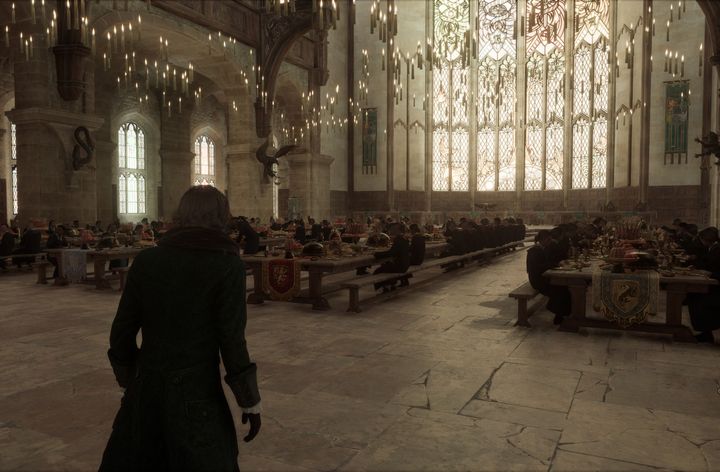
I don't think that's what the devs had in mind. They wanted to give us an everyman or woman, a vessel for our own personality that would allow us to feel like students of magic, casting spells and determining events. It failed because this "vessel" is already occupied; something is already inside, hidden and uncanny, which we can notice with its every creepy smile.
When I look at what my character says to the people he interacts with and how he does it, I get the impression that he treats them – and, in a way, myself – with complete disregard. He doesn't feel as much as he pretends to. In this empty "platform" there's no place for our emotions, because there's already something there, something that, frankly, disgusts me. Somewhere in the process, someone didn't notice that instead of creating an everyman, they'd made a psychopath.
This suspicion has been growing in me ever since early access launched. At first, I didn't vocalize it, thinking that maybe it was just my imagination – that my hero was a young, brave and smart boy who just wanted to be liked. The problem is that he doesn't want to be liked at all – we never really learn his desires, principles and goals. His face doesn't express emotions either – or if he does try to express it, he looks like he's just acting out.
Visually akin to nobody
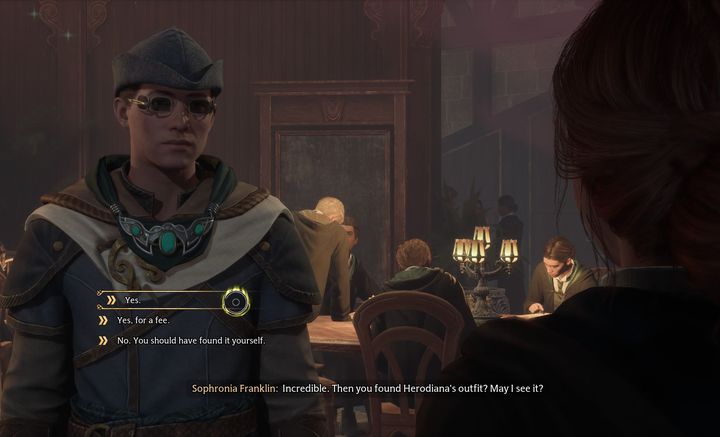
Of course, my entire investigation wouldn't be even possible if it wasn't for the limping animations and quirky character models. My avatar behaves like adolescent Charles Manson, but when I looked at my girlfriend's monitor, I noticed that her character looked like she was admitted to Hogwarts for a meth rehab. This apathy, dullness and indifference are inscribed in almost all the faces I see at Hogwarts, but it's most striking with the main character. They react to extreme situations, downright sad or shocking events, in a manner that makes me think they lost touch with reality years ago. At the very beginning, an enormous dragon smashes a stagecoach and devours it – in front of my eyes – I liked the driver, but that's not a reason to panic yet, right? In fact, it's not even reason enough to make the briefest remark. I'm a fifteen-year-old wizard from god knows where, accepted into Hogwarts god knows why, I just watched a giant reptile eat a man alive, but who fricking cares, check out these wicked ruins that I can explore!
During the game, the protagonist does make a few statements: they may sympathize with the wronged, the victims – or willingly join the path of vice – no matter which one it is, they just carry on giving absolutely zero flops about it – only speaking when spoken to, only acting when they must.
I run through the castle and visit surrounding villages. Sometimes I might help someone – like a woman whose brother is missing. When I solve the case, I'll tell her with disarming honesty that her brother died, turned into a zombie, and I had to kill him twice in the process. And the way in which this is said makes me thing that the only reason for saying it is to see how much it will hurt.
And one might say "Okay, but it's up to the player to decide what kind of hero they want to be, how they lead them, who they become." In theory – yes, but not really in practice. I mean, everything in this game is faux, and the main character has no character at all, because there seems to be no room for it in the world of magic, sorcery and psychopathy. Evil choices in the game are just as unconvincing as the good ones – even if we decide to rob someone, the expression on the avatar's face will be that of an elderly fish seller.
I'm not talking about choices per se, which for the most part don't matter much anyway. The game sometimes doesn't even care to give us the illusion of choice, somehow pushing me and my hero towards sociopathy. In one of the tasks, I undertake finding the souvenirs or private letters for the owner of a well-known inn. I find them scattered in the cave and instead of collecting them to give them back to the owner, the game displays the content of each one of them. I then return to the innkeeper and… ask her about the contents of her private correspondence. Maybe I was brought up in an extremely cultured fashion, but I was taught that in the phrase "private correspondence," the word "private" is crucial.
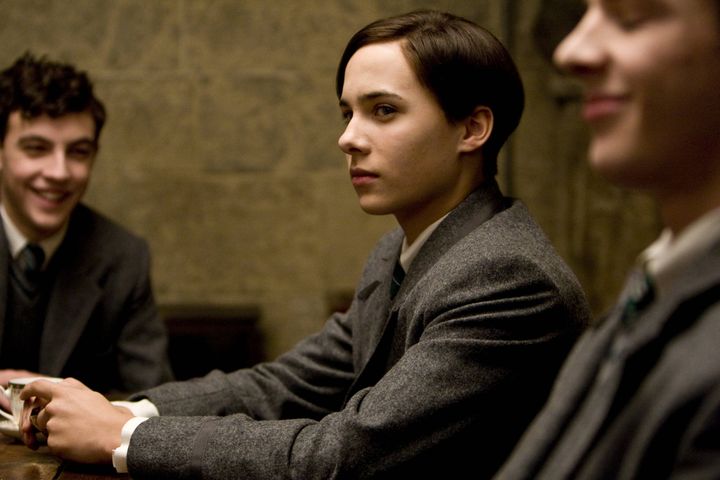
So, I run through these halls and remember that once upon a time, there already was one guy who pretended to be all-so-concerned-and-nice (or if we consider the game's timeline, he only will). Remember the part in the movies or books where Dumbledore visits little Tom Riddle at the orphanage? Tom looks sad, but we quickly begin to understand that there’s something else lurking underneath this countenance– not yet crystallized, not yet clear, but inevitable. When Tom finds out he's a wizard, he immediately applies a supremacist interpretation of the fact. Dumbledore quickly rebukes him for this, eternally, indeed, and – as the only person in the room – doesn't buy into Tom's game. Rightly so, as it will eventually turn out.
My character from Hogwarts Legacy reminds me exactly of Tom Riddle. They’re a hellishly talented person, who goes to Hogwarts (and we also don't really know their origin, at least at the beginning), where they really shine, winning the sympathy of both the students and teachers. An exemplary student! They will solve every riddle, deal with every assignment or spell, learn all the secrets of the school. They will save Hogwarts by finding the student responsible for opening the Chamber of Secrets (although, of course, it was Tom himself who opened it). The hero of the game most reminds me of Tom M. Riddle, who, in Slughorn's social club, first flashes teeth, flatters and puts vigilance to sleep, only to casually start a conversation about Horcruxes with a professor.
If you like Hogwarts Legacy, that's a sure sign that you're... a psychopath!
I read wise articles on the web about how to recognize a psychopath: the ability to camouflage and make a good impression on their surroundings, no remorse, no emotional involvement in personal relationships, no fear nor guilt, alluring but superficial personal charm to win over others, limited empathy or lack thereof, disregard for legal rules and norms, poor social interaction. Merlin's beard! It's about me!
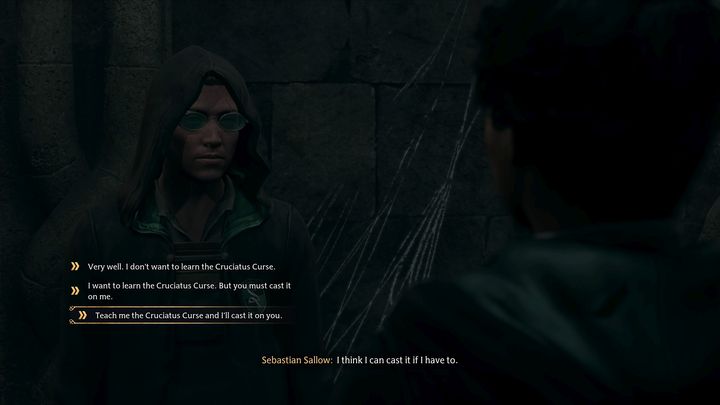
Laugh and scoff all you want, but, once I realized something was off with my character, I started having even more fun. This meager character allowed me to create a theory of a psychopath. And the game allowed for this monstrosity through mere... crudeness – bad dialogues, shallow characters, lackluster facial expressions and poorly written lines of the main character.
And of course, this whole investigation of mine is a bit of a joke, because I am well aware that the character, I control is just badly written. But you know – his alleged psychopathy made this game even more interesting for me. So, I like to think that long before Lord Voldemort and just before Gellert Grindelwald, the community of wizards was haunted by him: the magical psychopath from Hogwarts Legacy.
I encourage making your own experiments! Try to look at your protagonist as potential psychopath – watch how they behave in extreme situations, carefully observe their reactions. I wonder if you will see some of the horror that I discovered.
Now – if you made it to this paragraph without lashing out on me in the comments because I don't like a game, I hasten to assure you that Hogwarts Legacy ranks high in my personal game leaderboard. Mainly because of the world, the magic of exploration and the billions of references to the universe I've been exploring over the years. Really – it's a surefire GOTY candidate, despite its flaws. This doesn't mean that I can't be amused by – or unhealthily interested in – some of the quirks this game has proposed. Before we conclude, there are a few words I feel compelled to utter. Here they are: Nitwit! Blubber! Oddment! Tweak! Thank you!
3

Author: Matthias Pawlikowski
The editor-in-chief of Gamepressure.com, associated with the site since the end of 2016. Initially, he worked in the guides department, and later he managed it, eventually becoming the editor-in-chief of Gamepressure, an English-language project aimed at the West, before finally taking on his current role. In the past, a reviewer and literary critic, he published works on literature, culture, and even theater in many humanities journals and portals, including the monthly Znak or Popmoderna. He studied literary criticism and literature at the Jagiellonian University. Likes old games, city-builders and RPGs, including Japanese ones. Spends a huge amount of money on computer parts. Apart from work and games, he trains tennis and occasionally volunteers for the Peace Patrol of the Great Orchestra of Christmas Charity.
Latest News
- This is expected to be the biggest year in the company's history. Blizzard prepares an offensive that will overshadow previous years
- Bethesda envied CD Projekt RED? Starfield may undergo a Cyberpunk 2077-style metamorphosis
- Season 2 has just started, and Todd Howard is already writing the script for the third one. Fallout 5 will be changed by the TV show
- 5 games to grab on Amazon Prime Gaming. Among them, a collection of RPG classics
- My experience attending the 2025 Game Awards, and why I loved it


